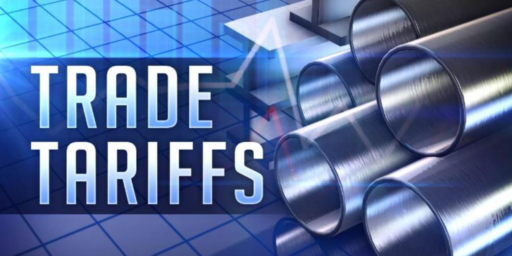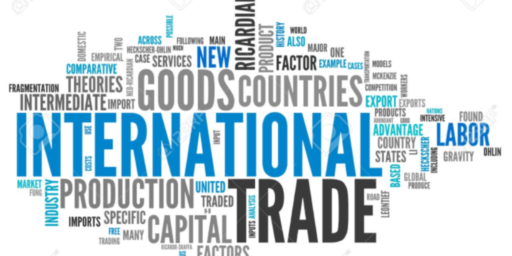STEEL SMOKE
President Bush’s decision to lift the steel tariffs he imposed is, predictably causing some political backlash. Indeed, much more flak than he’d have gotten had he never put these illegal measures in place to pander to the Rust Belt to begin with. While that serves him right, I would guess this controversy will die down by election time.
Emphasizing the gains made in the US steel industry while the tariffs were in place in the announcement lifting them was a shrewd political move:
These safeguard measures have now achieved their purpose, and as a result of changed economic circumstances it is time to lift them.
The U.S. steel industry wisely used the 21 months of breathing space we provided to consolidate and restructure. The industry made progress increasing productivity, lowering production costs and making America more competitive with foreign steel producers.
Steel producers and workers have negotiated new groundbreaking labor agreements that allow greater flexibility and increase job stability.
What’s really inexplicable to me is why he feels he needs to claim his reversal had nothing whatsoever to do with the WTO ruling they were illegal or pending EU sanctions. Not only are such claims wildly implausible, but they hurt him with free traders and waste an opportunity to be seen as multilateral and embracing international law.
WaPo does lead some credence to the “we were going to do this anyway” claim:
Administration officials had signaled that the tariffs would be lifted as far back as mid-September. Bush’s economic team had united in a push to lift them, arguing that they had cost more jobs among steel users than they had saved among steel producers. Even Bush’s political advisers, who had been instrumental in imposing the tariffs last year, had concluded that they may have backfired politically. Then in November, the World Trade Organization ruled the tariffs illegal, allowing other countries to prepare to impose retaliatory tariffs this month.
***
The timing of Bush’s decision puzzled even some administration officials. Earlier this fall, a review of the tariffs’ economic impact by the International Trade Commission provided the administration’s primary justifications for lifting them, showing that the steel industry had shed excess capacity, brokered groundbreaking labor pacts and become more internationally competitive under the tariffs’ protection.
But the administration waited to act until after the WTO — as anticipated — ruled the tariffs illegal, opening Bush to a barrage of accusations yesterday that he yielded to foreign pressure.
But, surely, the pressure from the international community had more than a little influence as well?
As David Sanger points out, WTO is doing exactly what we wanted it to do:
For the first time in his nearly three years in office, the president, who has often reveled in the exercise of American power, finally met an international organization that had figured out how to hit back at the administration where it would hurt. Employing relatively untested powers, the eight-year-old World Trade Organization authorized European and Asian nations to devise retaliatory tariffs against the United States, just 11 months before a presidential election. Not surprisingly, the Europeans pulled out an electoral map and proudly announced they would single out products made in the states Mr. Bush most needs to win a second term.
In fact, what the W.T.O. accomplished when it forced the Bush White House into a rare 180-degree turn was exactly what its American champions envisioned and its opponents warned about during the first big globalization debates of the 1990’s. Acting as the final arbiter of the world’s trade rules, it reversed the politics of protectionism, making sure that nations that protect their markets – in the name of saving jobs – are forced to pay a steep price.
Mr. Bush’s trade representative, Robert B. Zoellick, argued on Thursday that the president had reached an “independent decision” to lift the tariffs, and he acted as if the W.T.O.’s ruling that the tariffs are illegal was only a minor consideration in Mr. Bush’s deliberations.
But the raw political fact remains that the W.T.O. made the price of protecting the steel industry simply too high. It was left to the Europeans to design the penalties, and they pinpointed textile mills in the Carolinas and farmers in the Midwest and California with a precision that Karl Rove, the president’s political adviser, must have grudgingly admired.
“Defiance had real costs,” one of Mr. Bush’s senior aides said. “It was going to cost us exports and export jobs. It was going to cost us credibility around the world. It was going to put us at odds with Europe again.”
There was another potential cost: The United States wins many more cases than it loses at the W.T.O., and to ignore the steel ruling would be to invite Japan, China and Europe to ignore rulings in Washington’s favor.
So while the White House was loath to say so, Mr. Bush’s decision to comply fully with the ruling helped establish the trade organization’s authority, showing that even the world’s largest economic power, and the nation that spurred its creation, had to bend to its rulings.
For the organization that conservatives, and some liberals, once denounced as an “unelected bureaucracy” that should never be given power over American jobs, this case was the rough equivalent of Marbury v. Madison, the 1803 decision that established the Supreme Court as the final arbiter of the constitution, able to force Congress and the executive branch to comply with its rulings.
The US is one of the most ardent practitioners of free trade in the world. We don’t need tariffs to protect us. Giving up the right to play politics in a few cases where doing so might be helpful is a small price to pay for forcing states that are much more protectionist to play be the rules.
President Bush should have boldly proclaimed that he was yielding to international law and the wishes of Tony Blair and others. Not only would it have helped ease the domestic political cost of doing this–hell, he could have linked it to the need to have allies in the War on Terror–but it would have earned him some Brownie points in Europe.



Personally, I cringe at the thought of how such a statement (of ‘yielding to international law’) might be used (whether Bush wants it to be usable or not) as an excuse by others, later, to (even more strongly than they do now) insist that International Law (usually interpretable as ‘International Tacit Agreement That We Force The US To Treat As Law’) trumps US Law and the Constitution.
Dave,
WTO is international law in the sense that it’s a treaty that the United States willingly entered into. As a treaty–signed by the president and ratified by 2/3 of the Senate–it trumps domestic law but is subordinate to the US Constitution.